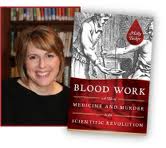 Eugenie Scott
Eugenie Scott, the Executive Director of the
National Center for Science Education, was interviewed in
Episode 21 of Books and Ideas. The focus of our conversation was the importance of teaching evolution in the public schools. Dr. Scott and the NCSE have worked for over 20 years to promote the teaching of evolution because it is an essential component of a modern education in the life sciences. Unfortunately, nearly 150 years after Darwin's
On the Origin of Species (1859) many Americans still reject this fundamental idea and much of Scott's work is focused on trying to keep creationism and so-called Intelligent Design out of school curriculum.
Recently the NCSE launched a very valuable site called
Expelled Exposed, which focuses on exposing the many inaccuracies presented in Ben Stein's recent pro-intelligent design "documentary"
Expelled. One of the things that has come out in numerous interviews is that the producers of the film mislead all the pro-evolution guests that appear in the film. We discuss this briefly near the end of the interview, but it was not the focus of our discussion. (see below for more links regarding
Expelled)
Since Dr. Scott has been interviewed about
Expelled and
Expelled Exposed on several other podcasts, I wanted to focus our interview more on the importance of accurate science education. Also, we discussed the fact that despite the claims of right-wing fundamentalists
there are many Christians and people of other faiths who accept the theory of evolution as scientifically valid. Accepting evolution does not mean one is choosing atheism. I think this is a very important distinction because while atheists are outspoken in their support of evolution they represent a small minority. I was encouraged to learn from Dr. Scott that the NCSE is working closely with religious leaders and scientists of faith to try to educate their members.
Since
Books and Ideas reaches an international audience I thought that it was important that we discuss the origins of the evolution versus creationism controversy, which is unique to the United States. Scott does an excellent job of explaining how our unique religious heritage along with our locally controlled school systems combine to create a situation that most of the world find's rather mystifying. Her book
Evolution vs. Creationism: An Introduction also provides an excellent overview of the subject from both an historical and scientific prospective.
Finally, we talk about the importance of evolution as a basic idea in modern biology. While we didn't dwell on this, I think we are both concerned about the implications for the future if a majority of young Americans are reaching college without a solid foundation in the principles of evolution. We also talked about why intelligent design fails to meet the basic definition of a scientific theory since it provides no testable hypotheses. Dr. Scott also provides a excellent review of the basic writings for those who want to learn more.
 Listen to Dr. Scott’s Interview
Listen to Dr. Scott’s Interview
Episode Transcript (Download PDF)
Links and References:
Other Books mentioned by Dr. Scott:
- Of Pandas and People: The Central Question of Biological Origins by Percival Davis and Dean H. Kenyon : the 1989 textbook that introduced the term “intelligent design”
- Darwin on Trial by Phillip E. Johnson, 1991.
- Darwin’s Black Box: The Biochemical Challenge to Evolution by Michael J. Behe
- The Design Inference: Eliminating Chance through Small Probabilities by William A. Dembski
- Behe MJ, Snoke DW. 2004. Simulating evolution by gene duplication of protein features that require multiple amino acid residues. Protein Science 10:2651-64.
Responses to Expelled Exposed by Christians
 Listen to Dr. Scott’s Interview
Listen to Dr. Scott’s Interview
 Subscribe to this podcast
Subscribe via iTunes™
Subscribe by email
Leave comments at the Discussion Forum
Subscribe to this podcast
Subscribe via iTunes™
Subscribe by email
Leave comments at the Discussion Forum












 Paul Offit, MD
Paul Offit, MD











